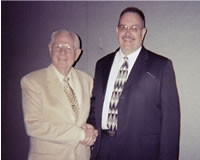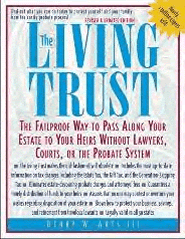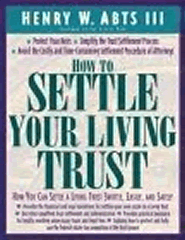
Family Living TrustsWhy Do Families Get Revocable Living Trusts? Is There Any Way To Do-It-Myself?
|
Why Do Families Get
Revocable Living Trusts?
(With appreciation and apologies to Stuart Ogilby, a fellow Estate Plan™ Advisor in Florida. See his excellent website and where I, with permission, stole much of the following at WiseBird.com/Estate.htm) Family Control and Peace When someone becomes incompetent, it is vital to family harmony that there be no doubt as to who has the authority to handle that person’s financial and health care situations. A Family Revocable Living Trust, Advance Health Care Directive and Durable Power of Attorney for Assets provide that family harmony. When parents die or become incompetent while their minor or disabled child still requires a legal Guardian, schools, health care providers, etc. need to know who to turn to. An Appointment of Guardian, working in conjunction with the Family Trust and other documents leaves no doubt as to who has the authority to care for the child. The Federal Estate Tax As a result of the Economic Growth and Tax Relief Reconciliation Act of 2001, the amount that is exempt from the estate tax will gradually increase and the top tax rate will gradually decrease in coming years. The I.R.S. will consider the current and future value of your retirement plans, your home, any life insurance (yes, your life insurance death benefit can be subject to the estate tax!) you might own, and any other savings or investments you've accumulated. Oh, yeah -- there is also the possibility that your state has its own tax. Probate If a lawyer offers to prepare a "Testamentary Trust" for you, look for “triple dipping.” He/she will get paid for the will, paid a second time for the Trust and paid a third time for the probate, because such a trust is funded only AFTER your estate has been probated. Subsequently, anyone can learn the amount of assets and property you left and to whom. This public information can be used to target your heirs for anything from legitimate charitable donation requests to questionable investment schemes. Even when your assets are held in joint tenancy, your estate will go through probate upon the death of the last joint tenant if assets are to be re-titled. If your attorney or CPA tells you that your estate (in the absence of a Living Trust) will not have to go through probate or gives you a specific probate cost, ask him or her to put it in writing. Passing assets and property through an appropriately designed Living Trust and related documents is a perfectly legal method for the purpose of helping protect your family’s privacy, simplifying the process of estate settlement and increasing the inheritance by eliminating probate costs, high attorney fees and minimizing taxes. For more on probate, check out the excellent websites ca-trusts.com and McKee Estate Services. We will work with you and a local specializing attorney to devise the strategy for your individual estate. |
|
You need to make that decision after getting opinions from experts you trust. These may include your tax preparer/accountant, your attorney, your financial advisor, your insurance agent/broker, your know-it-all brother-in-law or any combination of them. What you DON’T want to do is ask anyone who sells anything if you need what they sell. What do you expect the answer to be????? For your consideration, here are the opinions of some financial authors. They are not recommending or endorsing any Trust provider, including us. I am simply sharing their opinions. Making the Most of Your Money - Jane Bryant Quinn
The 9 Steps to Financial Freedom - Suze Orman Complete Book of Dollars and Sense - Kathy M. Cristof Smart Guide to Managing Personal Finance - Alfred & Emily Glossbrenner If You’re Clueless about Financial Planning and Want to Know
More - Seth Godin & John Parmelee
The Truth About Money - Ric Edelman
Invest in Your Self - 6 Secrets to a Rich Life - Marc Eisenson;
Gerri Detweiler; Nancy Castleman
Ernst & Young’s Personal Financial Planning Guide - 2nd
Edition
Dr. Tightwad’s Money-Smart Kids - Janet Bodnar Every Woman’s Guide to Financial Security - Ann Z. Peterson;
Stephen M. Rosenberg, CFP Money Clips - 365 Money Tips That Will Pay One Day at a Time -
Lorraine Spurge 8 Ways to Avoid Probate - Mary Randolph
Inheritor’s Handbook: A Definitive Guide for Beneficiaries
(As reported in Esquire Magazine, January 1999) - Dan Rottenberg Pros and Cons according to MSN A New, Potentially Significant Advantage of Trusts Of course, there is the contrarian opinion, as expressed by Kiplinger.com I recently had the following question from a very sweet lady I have
known professionally for years: |
|
There have been those who have tried. They will use the wording of someone else’s Trust and try to adapt it to their situation and make it “sound legal.” But the question is – will all custodians (banks, credit unions, etc.) of the assets owned by the Trust accept the wording of the Trust after the creator of the Trust is deceased? If not, the assets will be stuck in an inaccessible account and attorneys or the courts will have to get involved to straighten out the mess. In addition, who will be there for the family when the creator of the Trust dies? Who will explain proper procedures and current requirements for settling an estate? One of my clients is an attorney. It’s not about just getting a document or even a set of documents. Your family needs a network of people who will help them now, in the future and at your death and do it COMPETENTLY! Sorry, didn’t mean to yell. |
|
Well, there you indeed have some options. When using any of these, ask the following questions: 1. Can I call you over the years when questions arise? 2. Can I call you when I need to amend the Trust or other documents? 3. When a death occurs, can my family call you to assist them with settlement? 4. Will you monitor the state and federal law and I.R.S. rulings / letters and notify me immediately if any changes in them affect me? or better yet, print the Consumer’s Information Guide for Trusts which I wrote to help those who just have to shop. Your Living Trust Source Options
3) THE SEMINAR-IANS
And another from The Attorney General of California And another from the California Department of Insurance (see the end of page 2) 4 ) OR there is The
Estate Plan™ and The Estate Plan™, Henry Abts national Trust corporation, has been the nationally recognized leader in providing the most comprehensive Living Trust for the past quarter of a century. This properly written and supported Living Trust is a simple, inexpensive way to eliminate the costs and delays of probate and ensure that your loved ones will receive their inheritance promptly and exactly as you intended. It also allows you to plan for your own incapacity and for avoiding competency hearings. Mr. Abts is also the author of these nationally best-selling books on Living Trusts and how to settle them. The Estate Plan™ is the only authorized distribution source of the powerful, perfected, and time-tested documents described in these books.
Over 25 years of document preparation are behind The Estate Plan™
Universal Living Trust™ documents; over 50,000 trusts have been
prepared; over 5,000 estates have been settled without complications.
The Estate Plan™ is the industry leader for Living Trusts and
superior estate planning documents. I will not attempt to sell you an annuity. I do not want your investment business. And this will not happen. I will treat you as I would treat a beloved member of my own family.
If you believe that a Trust is appropriate for your family, print and fill out these one or two pages and call me. My name is Bob. I can help.
|




